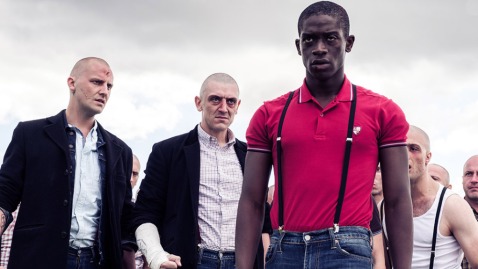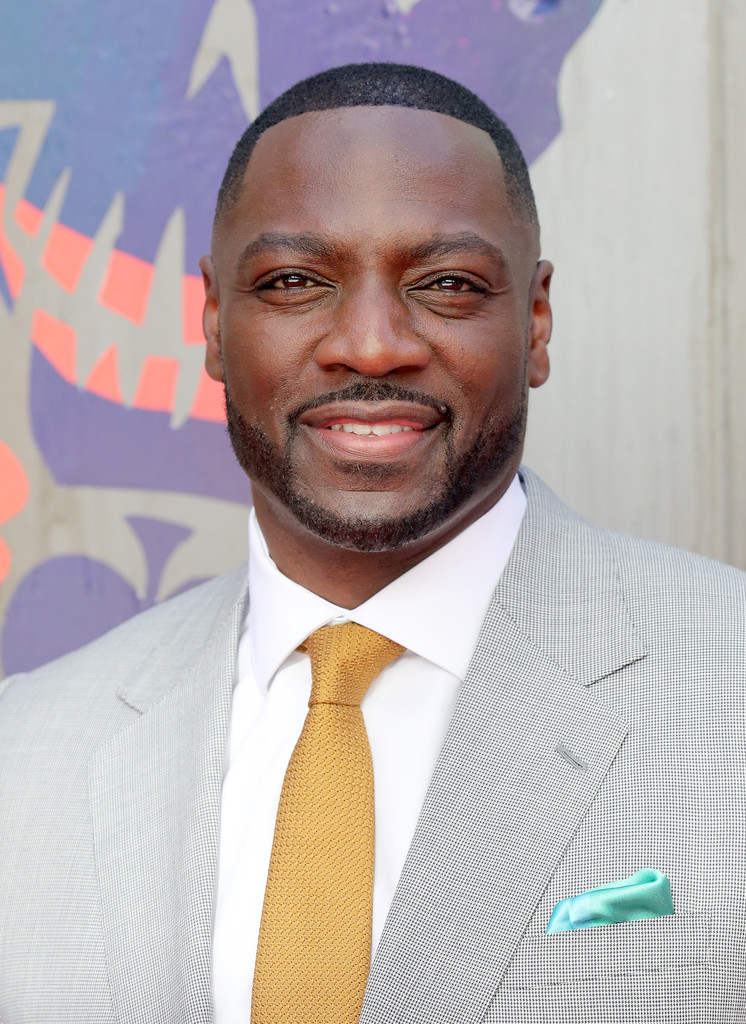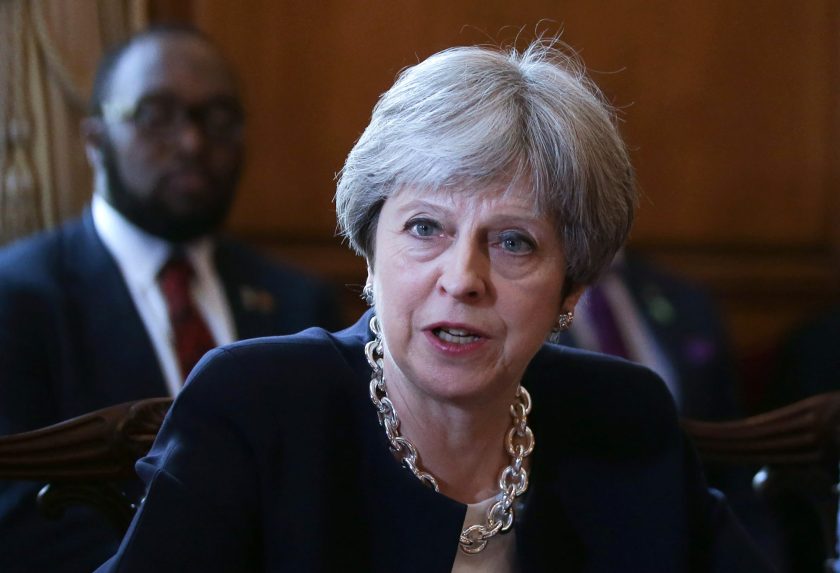Immigration, it seems, is the new trauma, the new misery-art, featuring….Nigeria (lately). In the last couple of weeks I’ve watched Farmed, a harrowing tale of a Nigerian boy’s journey from relatively good-naturedly racist foster home to Nigeria back to foster home and then into the arms of the local skin-heads first as a pet then as a not quite fully fledged member (as he finds out) and The Last Tree, a less-but-still harrowing tale of a Nigerian boy’s journey from non-racist foster home to Inner City London to Nigeria.

The context of both films is the practice of Nigerian parents of sending their children to foster homes while they continue their education, save money and/or look for jobs which will bring in enough money to take care of their families. Farmed, based on actor Adewale Akinnuoye Agbaje’s experiences, takes place before parent-friendly education and work policies. In The Last Tree, I presume the mother just couldn’t afford to have a small child with her, regardless of any family friendly job opportunities which may have existed in the 1980s or 1990s when the film was set.

Immigration stories have always been popular. I’ve recently re-read CNA’s Americanah, a tale of two immigrants and their separate traumas. In non-fiction or ‘real life’, we are not too far away from horror stories emanating from Theresa May’s hostile environment and Youtube clips of people telling us that they voted to leave the European Union to keep the Africans out. Both of these are, in my view, the result of decades of demonisation and criminalisation of immigrants combined with under-investment in public services, including immigration control, and a reliance on scaring the public out of their wits of a UK brimming with immigrants singularly focused on stealing their jobs and stripping their public services to the bone.

But immigration is trauma. That may sound dramatic but in its own way it is, even when that trauma is not anybody’s fault. Regardless of your race and colour, if you can see your parents whenever you want (in theory; they might be avoiding you) and grew up with your grandparents only a drive away in a house they have lived in for forty years and maybe even got a glimpse of your great-grandparents or just missed them because you were born 3 days too late, you will never completely understand the hopeful trauma that is immigration.
Immigration, in the time period in which Farmed was set, was entrusting your children to strangers while working hard to get them out of there as soon as possible. Yes, white was right but having experienced racism yourself, perhaps you knew that plonking black children in a world that was conditioned to believe that black was inferior and proximity to the West was always an improvement, might not be altogether a wholesome experience.
Immigration is being wrenched from the world you’ve always known to stressed-out parents who treat you like we all sometimes treat our kids – 15% treasure, 85% nuisance. It is relatives who expect you to suddenly understand their strange customs and parents who scream at you for embarrassing them by not greeting elders like you are supposed to. It is grandparents who are openly contemptuous because you don’t know to jump at their every command and you flinch at traditional customs and foods.
Immigration is not seeing your parents for decades and being unable to visit them when they are ill or even attend their funeral because of financial or immigration-related constraints. Immigration means being fearful, even when you are a citizen or have permanent leave to remain or whatever, of a journey that starts at border control on the way to your country of origin. A fear which has been justified by stories of British citizens of Caribbean origin being conned out of their status documentation and then barred from re-entry in the UK as a matter of government policy.
Immigration is 19-year old me attending a meeting with a head teacher because my 14-year old brother was acting up and my parents were not in this country. It is me carrying the guilt of my brother’s eventual criminality, breakdown and mental health issues because I didn’t know how to be selfless enough to be a proper parent to him.
Immigration may have a hand in why Priti Patel can’t just be a fascist in peace, she has to also be a ‘ third generation immigrant’ (as someone on Twitter put it – although she said she was a ‘daughter of immigrants’. Wouldn’t that make her a ‘second generation immigrant’ or, what’s the word for it again? Oh yes, British) It may be why British Asians have to loudly declare their love for Britain before being allowed to criticize anything about it. Or why Asian men still answer to names Bobby, Bob, Rob, Craig and Chuck, short for Aziz, Awra, Raja, Amar and Razik.
Immigration is me in 2017 trying to understand why my blind mother was being threatened with deportation by one department of the Home Office and sent her 1978 permanent leave to remain documents by another. Immigration is me dealing with this saga for 2 years and still feeling ashamed when I had to talk about it, even to my husband and mother in law.
For immigration is indeed about shame. Through a set of historical events and political and racial manipulation, Britain has drawn immigrants from all over the world, including the Commonwealth being the countries formerly colonised by Britain. In some of these countries, a lot of people are living in circumstances which most people would find intolerable, from wars and conflicts (contributed to by Britain’s meddling in some cases) to situations of such bleak economic outlook that there is very little hope of any meaningful future for them and their children.
The United Kingdom has a right to control her borders of course. But British people emigrate for far less (I don’t want to measure the weather). People who immigrate to the United Kingdom are doing what anyone else would do in their position. Allow them entry, let them stay or not but there is really no need to make them feel ashamed. So ashamed that some of the victims of the Windrush scandal were almost more nervous about publicising their newly uncertain immigration status than the precarious situation they had been placed in. Immigration is a practical, governance issue not a moral one.
The irony is that a lot of immigrants are still being invited here to fill in skills gap from the NHS to various skilled workers and migrants schemes. Farming Today recently reported that the agricultural industry needs 70,000 migrant workers to pick fruit which is rotting by the tonne in bushes, fields and trees. The current farm workers migrant worker scheme only allows for a fraction of the required numbers. In carefully managed ignorance of this kind of thing, a large number of the British public voted for Brexit.
Immigration is being relieved you are no longer in the ‘old country’ but feeling strangely defensive about any criticism of it, which pales in comparison to your previous criticisms but somehow seems hollow and dehumanising, lacking in context and complexity.
Immigration is the lack of logic in feeling ashamed of your accent and trying to change it as soon as possible. Your accent is a product of where you grew up. You grew up where you grew up. It is a fact and neither good nor bad. Even if you have no secrets about your life and a spanking new British passport and it is very obvious from your appearance that you are not the Queen’s cousin, eight times removed , you find yourself subconsciously hiding this part of yourself and your heritage from others.
Immigration is stumbling over the question ‘where are you from?’. If you never stumbled over that question, you do not know diluted joy of being an immigrant. Your mind races, in about three seconds, through a series of questions wondering what they are asking, what they really want to know and how you can reassure them, even you are not sure what you are supposed to be reassuring them of. You stumble through your well-rehearsed, but never well-delivered story, of how you were born in this country, went back to Nigeria because of whatever and came back whenever because of ‘instabilities’ until they kindly let you know that they were just asking what city you lived in.
Incidentally, I’m not sure what I think is going to happen if I don’t launch into a long explanation which ends in me firmly asserting my British citizenship. Do I think friends and acquaintances are going to ‘report me to immigration’? And so what if they do? I am a British citizen, aren’t I? The answer to that is that there is something negative about being from another country and living in the UK. You feel you have to explain why you are taking up their ___________
Immigration is coming to terms with all of the above only to relive the trauma when your children become of school age and you wonder whether it’s your kids that no one wants in their school because the more colour a school has the less likely it is to be ‘a good school apparently1‘ (I’m talking about regional England now not the liberal London Islington elite daring to express an opinion to the daughter of immigrants or whatever nonsense Priti Patel was spouting).
Immigration can of course be much worse. I’ve watched friends unable to work, having no future back in Nigeria and unsure of how much time to invest in the hope that they will become legal citizens. It can be living stripped of status, stateless in a hostile environment. It can be a state of being forced into criminality simply because there is no other way to survive. It can mean existing as an abused person, a slave or a victim of trafficking at the ‘mercy’ of hardened criminals simply because there is no where to go and no one to report anything to.
Immigration can be good trauma. Something that benefits in the future or knocks some sense into your head like finally catching your flaky boyfriend snogging another girl. But seriously, immigration frequently is positive beyond the opportunities available to you in their new country of residence and despite the questions and the negatives, the acceptance and politeness, especially in the UK.
Immigration can mean opening up to new cultures and new ways of life and ridding yourself of classism and other prejudices which was your way of life. For example, before the internet and its unreliable wokeness, many Nigerians were die-hard homophobes who had never met anyone who would admit to being gay and who have shed that prejudice as a result of their new country. Many of them lived in gated communities where they were taught not to think of working class or poor Nigerians as full humans like themselves and have found themselves, reluctantly or otherwise, interacting with Nigerians and people from all walks of life.
As in ‘The Last Tree’, many Nigerians grew up thinking that beating and physically punishing a child was the hallmark of good parenting, one that set them apart from these lax white people and useless ‘West Indians’, who let their children run riot, instead of the parental abuse which we now know that it is. That strategy has come home to roost, like the fabled chickens, as the news reports now feature violent West African young men who were probably brought up in that way. Not only ‘JAH-my-cans’ then. I found Femi’s mother’s behaviour appalling in those scenes , but also familiar, both from my childhood and as a parent and I am distressed by this.
One last word about the films. Femi and especially Enitan embodied the kind of surly, young, seemingly impenetrable older black teenage boy or young man that some people would cross the road to avoid, if only they could figure out how to do it in a way in which the person they are trying to avoid doesn’t notice. Faces that seem angry, invariably darker skinned, expressionless, hooded eyes, hoods (if worn) up, their walk a concentrated, forward-leaning, focused gait, their fists partly clenched. People are scared to look at them for too long or to get in their way in any other manner. They fear that once those boys get angry with you, no amount of reasoning would stop them from carrying out whatever course of action they think is justified. Dehumanising and reductive for starters and I dread to think how many black boys just walking around, thinking about their Tesco shop, are subjected to this kind of stereotyping. In the case of the films, the person doing the stereotyping would have been partially right, particularly in the case of Enitan.
What saves both boys and turns them into smiling, relatable human beings again is their association with Nigeria. In the first film, Enitan’s parents, now barristers in Nigeria, stump up the cash to send him to a special school which turns him from semi-illiterate skin-head to the holder of a masters degree in law and in the second, Femi’s trip back to Nigeria completes his healing.
What happens to the black boys for whom there is no deus ex machina from the motherland? But I digress. The one thing these films do well is show that immigration is a trauma. A necessary, unavoidable trauma, and not all bad, but it is something that, in your own small way, if you are immigrant, you are continually recovering from.
This essay contains parts of an essay which I have partially written called “The Windrush Scandal and A Very Big Problem Called Immigration” which I will hopefully complete and post some day.
1You can in theory spend your time looking for a good school or area before realising it is you, your child and others like is what some people think make a school or area ‘bad’.

